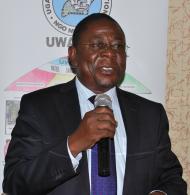Published on: 01/10/2015

At the annual WASH CSO Forum held on 30 September 2015, civil society organisations reaffirmed the view that they are important in the 2030 Sustainable Development Goals (SDG) Agenda and they would play a critical role in the implementation and monitoring of the goals, especially Goal number 6 – Ensure availability and sustainable management of water and sanitation for all.
The theme for this year's forum is: "Uganda beyond 2015: Leaving No One Behind; make water and sanitation rights a reality". Throughout the discussions, great emphasis was placed on the need for increased public financing for the WASH sector. Engineer Aaron Kabirizi, Director of Directorate of Water Development (DWD) made ten key observations which he said deserve great attention in order for the sector to move towards universal access of water and sanitation.
These ten key observations were:
- Government cannot be replaced. Of all the actors in the sector, government is the constant. Many actors come into the sector and they exit. But government is here to stay. Therefore CSOs must learn to work with government.
- The WASH sector cannot develop without public financing. Government should be able to allocate adequate resources to the WASH sector.
- Good governance and accountability are of paramount importance in the WASH sector. Previously, fingers were pointed at the government as not accountable and generally corrupt. But it must be noted that the NGOs are just as guilty. Both government and non-government actors should be asking: What are we not doing well?
- Integrated planning is key. Duplication is wasteful.
- Universal WASH coverage is not such a crazy idea. It is achievable. That is why there is a lot of advocacy around it. The Minister of Water and Environment, Professor Ephraim Kamuntu is a champion for universal access to safe water and sanitation. He is on record for proposing that sector success should be measured according to how much is left to be done in an effort to attain universal coverage.
- Policy shift: To realise universal WASH we need some shifts in policy. We need simple policies for example about payment of tariffs for water. Legislators and policy makers need to speak out for WASH.
- WASH technology: Innovations abound but they require funding. The sector is full of technical people who have the capacity to invent and innovate technologies. But without funding, they cannot go far. It is up to sector actors to determine where to invest more resources.
- Open Defecation Free (ODF) environment: We can't stop talking about it! The efforts must continue until Uganda is completely ODF
- To deliver WASH services, there is a need for integrated planning, even among government ministries and departments. The lack of coordination and joint planning between departments leads to duplication and wastage of valuable resources.
- Community sensitisation is no simple job. Efforts must continue. People take long to understand and to change. Many technical people in the sector have gone through long processes of rigorous education and training, which enables them to work out complex WASH issues. Yet the same people expect common people – most of whom are half-literate – to understand WASH issues and act on them as expected.
